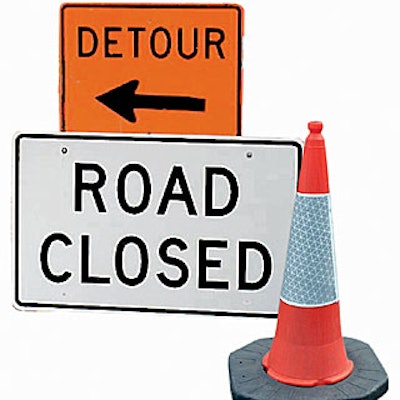Lots of events—from parades to movie premieres with outdoor press areas—require taking over New York streets. Getting the permits can be a complicated process requiring lots of time and paperwork. So here’s some expert advice to help get around the bureaucratic roadblocks.
Start Early
Getting a street-closing permit requires filling out an application with the appropriate city agency and providing details about the event in order to get approval, which is by no means guaranteed. Event producer Elliot Winick, president of Elliot Winick Productions, is many people’s go-to guy for permits; he processes 300 to 400 permits a year. Although he has obtained a permit in as little as two days, he typically likes to have about a month before the event.
While 90 days would typically be a safe lead time, depending on the type of permit needed you may be required to submit an application by the end of the previous calendar year. Some permits require the approval of a local community board before the application can be submitted to the appropriate agency, which also takes time. It’s best to contact the agency as early as possible to find out the specific requirements.
“It can get backed up because there are lots of applications,” says Full House Events’ Josh Arker, who worked in the mayor’s office for two years, where he regularly closed streets for city events.
Work Your Angle
Getting a permit depends on the streets involved, the neighborhood, and the nature of the closing. “You have to explain to them what your event is about and why it is important,” says Workhouse Publicity C.E.O. Adam Nelson. “The city can be lenient when they believe in something and difficult when they don’t understand.” For example, Winick says, “You are more likely to get a permit to close a street for a public school fund-raiser than for the opening of a retail store.”
Think Small
Be realistic about what you really need for your event. “Try to avoid the word ‘closed,’” Winick says. “If you ask the city, they will say they don’t close streets because it is a problem for the community.” Instead, Winick tries to achieve clients’ goals while using as little of a street as possible. “If they only want a limo arrival lane, closing the entire street would be denied. And if you actually closed the street for that, the spillover effect could cause a traffic jam and actually be detrimental.” Instead, Winick obtains permits for lane closings, restricted parking, or restricted access. For the opening of Taboo on Broadway, Winick convinced producer Rosie O’Donnell that forbidding parking in the drop-off lane would be better than closing the entire street and blocking traffic in the busy theater district.
Cover Your Bases
“No matter who the lead agency is, you have to get approval from other agencies,” Winick says. While city agencies usually talk to one another about permits, Arker suggests covering the bases yourself: “Let the local police precinct, fire department, the sanitation department, the Department of Transportation, the local community affairs office, and any other agency you can think of know what is going
on.”
Jean McFaddin, who was the executive producer and director of Macy’s events—including the Thanksgiving Day Parade—for 25 years, suggests contacting the community liaison at your local police precinct first for help. “They can advise you what they would approve and are sensitive to the realities of the city,” says McFaddin, now president of event consulting firm McFaddin Event Associates. “Maybe doing your event an hour earlier or an hour later could make a difference in whether your application gets approved.”
Consider Going Guerrilla
For some planners, one option—one we don’t necessarily recommend—is to forgo permits altogether and risk not being able to execute your event as planned. The key to going guerrilla, says Nelson, is to be flexible. “You have to be able to fly by the seat of your pants and change locations if necessary,” he says. This tactic works best for events that are easy to move. For the 2004
New York Super Boat Grand Prix, Nelson’s crew parked a 70-foot speedboat in various spots around the city to hand out invitations and T-shirts without obtaining any permits. “The police officers in Times Square were very accommodating,” he says. According to an NYPD spokesman, if you get caught, your event could be shut down and you may be issued a court summons; then a judge might determine a fee.
Expect the Unexpected
Winick suggests doing a site survey of the street a couple days before the event to check for signs about roadwork, construction, filming, or anything else that could interfere with your event. For the Elephant Walk to Madison Square Garden for the Ringling Bros. and Barnum & Bailey Circus, he checked out the roads in advance and discovered some were slated to be repaved that night. He called the Department of Transportation and asked them to reschedule the repaving—or the elephant’s footprints were going to create some major potholes. They obliged—a rare occurrence, he says.
Winick also hands out flyers to residents and businesses in the community so other potential problems can be addressed in advance. When Nelson closed a residential Brooklyn street for Francis Ford Coppola’s pasta promotion in June 2001, a city mandate required him to collect 200 residents’ signatures supporting the street closing, even though he had the support of other city agencies and officials. “It was easy to convince people to agree when
we told them we were bringing in everybody from The Godfather and there would be free pasta and wine,” he says.
But no matter how well you prepare, expect the unexpected. “You’re dealing with a living, breathing part of the city,” Nelson says. “Unpredictability lies behind every shadow.”
—Ellen Sturm Niz
Contacts:
For street fairs, festivals, block parties, and other events that require completely closing a street:
Mayor’s Community Assistance Unit (CAU) Street Activity Permit Organization (SAPO)
100 Gold Street, 2nd Floor
New York, NY 10038
212.788.7439
www.nyc.gov/html/cau/html/street_activity/vendor_permits.shtml
For a moving event, such as a parade or race:
Contact the community affairs office at the local NYPD precinct; find phone numbers here:
www.nyc.gov/html/nypd/html/phone.html
For events that require closing a street in a park:
Department of Parks & Recreation
Citywide Special Events
212.360.3456
www.nycgovparks.org/sub_permits_and_applications/planning_an_event.html
For construction prior to or during an event, such as using a crane or building a tent, apply in person at:
Department of Transportation Office of Construction Mitigation and Coordination (OCMC)
220 Church Street, ground floor
New York, NY 10013
212.442.7954
www.nyc.gov/html/dot/html/permits/stpermit.html#permittypes
This story originally appeared in the November/December 2004 issue of the BiZBash Event Style Reporter.
Start Early
Getting a street-closing permit requires filling out an application with the appropriate city agency and providing details about the event in order to get approval, which is by no means guaranteed. Event producer Elliot Winick, president of Elliot Winick Productions, is many people’s go-to guy for permits; he processes 300 to 400 permits a year. Although he has obtained a permit in as little as two days, he typically likes to have about a month before the event.
While 90 days would typically be a safe lead time, depending on the type of permit needed you may be required to submit an application by the end of the previous calendar year. Some permits require the approval of a local community board before the application can be submitted to the appropriate agency, which also takes time. It’s best to contact the agency as early as possible to find out the specific requirements.
“It can get backed up because there are lots of applications,” says Full House Events’ Josh Arker, who worked in the mayor’s office for two years, where he regularly closed streets for city events.
Work Your Angle
Getting a permit depends on the streets involved, the neighborhood, and the nature of the closing. “You have to explain to them what your event is about and why it is important,” says Workhouse Publicity C.E.O. Adam Nelson. “The city can be lenient when they believe in something and difficult when they don’t understand.” For example, Winick says, “You are more likely to get a permit to close a street for a public school fund-raiser than for the opening of a retail store.”
Think Small
Be realistic about what you really need for your event. “Try to avoid the word ‘closed,’” Winick says. “If you ask the city, they will say they don’t close streets because it is a problem for the community.” Instead, Winick tries to achieve clients’ goals while using as little of a street as possible. “If they only want a limo arrival lane, closing the entire street would be denied. And if you actually closed the street for that, the spillover effect could cause a traffic jam and actually be detrimental.” Instead, Winick obtains permits for lane closings, restricted parking, or restricted access. For the opening of Taboo on Broadway, Winick convinced producer Rosie O’Donnell that forbidding parking in the drop-off lane would be better than closing the entire street and blocking traffic in the busy theater district.
Cover Your Bases
“No matter who the lead agency is, you have to get approval from other agencies,” Winick says. While city agencies usually talk to one another about permits, Arker suggests covering the bases yourself: “Let the local police precinct, fire department, the sanitation department, the Department of Transportation, the local community affairs office, and any other agency you can think of know what is going
on.”
Jean McFaddin, who was the executive producer and director of Macy’s events—including the Thanksgiving Day Parade—for 25 years, suggests contacting the community liaison at your local police precinct first for help. “They can advise you what they would approve and are sensitive to the realities of the city,” says McFaddin, now president of event consulting firm McFaddin Event Associates. “Maybe doing your event an hour earlier or an hour later could make a difference in whether your application gets approved.”
Consider Going Guerrilla
For some planners, one option—one we don’t necessarily recommend—is to forgo permits altogether and risk not being able to execute your event as planned. The key to going guerrilla, says Nelson, is to be flexible. “You have to be able to fly by the seat of your pants and change locations if necessary,” he says. This tactic works best for events that are easy to move. For the 2004
New York Super Boat Grand Prix, Nelson’s crew parked a 70-foot speedboat in various spots around the city to hand out invitations and T-shirts without obtaining any permits. “The police officers in Times Square were very accommodating,” he says. According to an NYPD spokesman, if you get caught, your event could be shut down and you may be issued a court summons; then a judge might determine a fee.
Expect the Unexpected
Winick suggests doing a site survey of the street a couple days before the event to check for signs about roadwork, construction, filming, or anything else that could interfere with your event. For the Elephant Walk to Madison Square Garden for the Ringling Bros. and Barnum & Bailey Circus, he checked out the roads in advance and discovered some were slated to be repaved that night. He called the Department of Transportation and asked them to reschedule the repaving—or the elephant’s footprints were going to create some major potholes. They obliged—a rare occurrence, he says.
Winick also hands out flyers to residents and businesses in the community so other potential problems can be addressed in advance. When Nelson closed a residential Brooklyn street for Francis Ford Coppola’s pasta promotion in June 2001, a city mandate required him to collect 200 residents’ signatures supporting the street closing, even though he had the support of other city agencies and officials. “It was easy to convince people to agree when
we told them we were bringing in everybody from The Godfather and there would be free pasta and wine,” he says.
But no matter how well you prepare, expect the unexpected. “You’re dealing with a living, breathing part of the city,” Nelson says. “Unpredictability lies behind every shadow.”
—Ellen Sturm Niz
Contacts:
For street fairs, festivals, block parties, and other events that require completely closing a street:
Mayor’s Community Assistance Unit (CAU) Street Activity Permit Organization (SAPO)
100 Gold Street, 2nd Floor
New York, NY 10038
212.788.7439
www.nyc.gov/html/cau/html/street_activity/vendor_permits.shtml
For a moving event, such as a parade or race:
Contact the community affairs office at the local NYPD precinct; find phone numbers here:
www.nyc.gov/html/nypd/html/phone.html
For events that require closing a street in a park:
Department of Parks & Recreation
Citywide Special Events
212.360.3456
www.nycgovparks.org/sub_permits_and_applications/planning_an_event.html
For construction prior to or during an event, such as using a crane or building a tent, apply in person at:
Department of Transportation Office of Construction Mitigation and Coordination (OCMC)
220 Church Street, ground floor
New York, NY 10013
212.442.7954
www.nyc.gov/html/dot/html/permits/stpermit.html#permittypes
This story originally appeared in the November/December 2004 issue of the BiZBash Event Style Reporter.




















